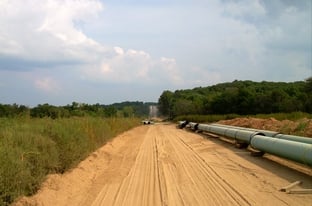Guest Column: The Keystone XL Decision was Wrong

America was dealt a devastating blow by our “Dear Leader.” With the flick of his pen, President Obama killed 20,000 construction jobs, destroyed at least $7 billion in new investment, committed the U.S. to sending $36 billion a year to hostile dictatorships like Venezuela for years to come, and set the wheels in motion to send China almost one million barrels of North American oil every day.
The president’s decision to kill the Keystone XL pipeline had all of these effects. The most immediate effect was to kill off 20,000 construction jobs financed with private money instead of taxpayer money the president favors spending. I testified before the State Department about the importance of the Keystone XL project and the regulatory scrutiny it had already successfully overcome. Testifying with me were hundreds of scientists and engineers who attested to the safety and necessity of the project. Also testifying were construction workers, steelworkers, and average citizens who need the jobs this project would bring.
On the other side of the Keystone XL issue, there was a group of people attempting to shout me and other supporters down. They were parroting 1980s movie star Daryl Hannah and saying Keystone XL would make Americans “slaves to fossil fuels.” Unfortunately for us, President Obama listened to his Hollywood pals instead of those of us who calmly presented factual information.
Not only would Keystone XL have brought jobs to the United States, it would have bolstered our national security by bringing us almost one million barrels each day of secure, North American oil. This oil could have displaced the oil we now buy from Venezuelan Dictator Hugo Chavez — oil that costs the United States almost $100 million each day. This money allows Chavez to support his socialist agenda and oppress his people. Obama’s decision to deny Keystone XL has Chavez laughing all the way to the bank.
Hugo Chavez isn’t the only one who is happy about Obama’s decision. The Communist Chinese Government is also thrilled. Canada has said that if the United States won’t take their oil, they must find another buyer, and that buyer is probably China. The environmentalists who opposed this project either aren’t very smart or they aren’t being honest. They should want that oil to be refined in the United States, where we have strong environmental regulations. Instead, the oil will now likely go to China, where environmental regulations are practically nonexistent, and where permitting consists of bribing the right Communist Party official.
Some opponents say they are concerned about safety. As the safety regulator of over 170,000 miles of pipeline, some of which are larger than Keystone XL, I am confident that the safety and environmental safeguards that would have been in place on Keystone XL would ensure a safe and efficient pipeline. Presently, there are pipelines operating in all of the areas Keystone XL would cross. These pipelines operate with little fanfare and few issues. Piping the oil to Texas Gulf Coast refineries would have been safer than piping it to a shipping terminal, loading it on a tanker, shipping it to China, and putting it in the Chinese pipeline system.
Finally, there are those who say the tight permitting timeline of the decision on Keystone XL is what caused its demise. That’s simply untrue. The first applications for Keystone XL were submitted in 2008, with 2011 being the expected permit issuance date. As recently as April 2011, the State Department issued a press release saying they expected “a decision on whether to grant or deny the permit before the end of 2011.” It was only after environmentalists joined with Occupy Wall Street protesters and held a circle around the White House that the President made a political choice to try to delay the decision until after the 2012 elections. Congress instead gave the President a two-month extension to the evaluation deadline, which forced the President to show his hand before the November election.
In an ironic twist, the President’s Jobs Council released a report calling for an “all-of-the-above” energy strategy, which would mean increasing North American oil and gas production. The next day, the President killed Keystone XL and eliminated 20,000 jobs, then hopped in Air Force One and used about 11,000 gallons of jet fuel to fly to Disney World. Unfortunately for America, Mr. Obama sees no problem with saying one thing one day and doing the opposite the next. Perhaps Disney World is a good place for the President to remain since he so clearly lives in a fantasy land.
Barry Smitherman is a Texas Railroad Commissioner and a former member of the state's Public Utility Commission.

